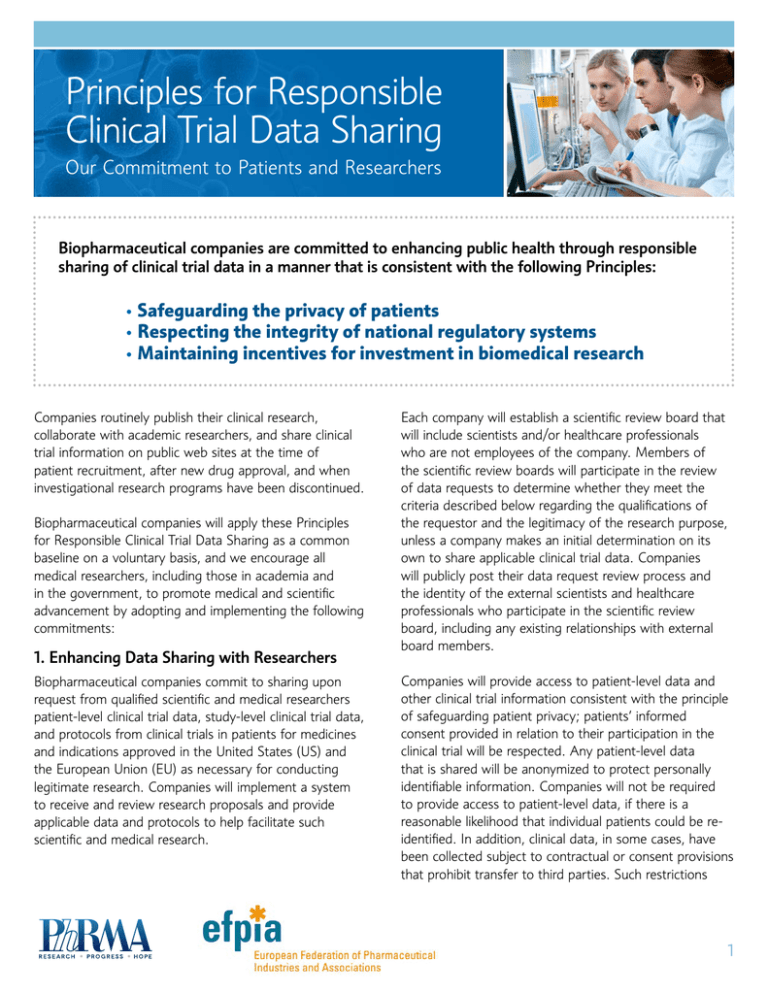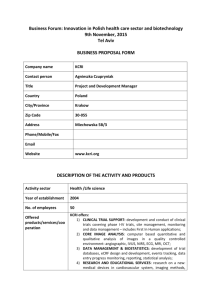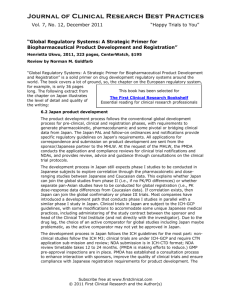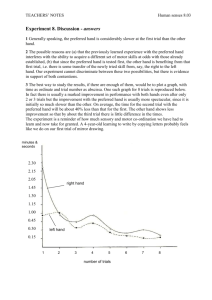Principles for Responsible Clinical Trial Data Sharing
advertisement

Principles for Responsible Clinical Trial Data Sharing Our Commitment to Patients and Researchers Biopharmaceutical companies are committed to enhancing public health through responsible sharing of clinical trial data in a manner that is consistent with the following Principles: • Safeguarding the privacy of patients • Respecting the integrity of national regulatory systems • Maintaining incentives for investment in biomedical research Companies routinely publish their clinical research, collaborate with academic researchers, and share clinical trial information on public web sites at the time of patient recruitment, after new drug approval, and when investigational research programs have been discontinued. Biopharmaceutical companies will apply these Principles for Responsible Clinical Trial Data Sharing as a common baseline on a voluntary basis, and we encourage all medical researchers, including those in academia and in the government, to promote medical and scientific advancement by adopting and implementing the following commitments: 1. Enhancing Data Sharing with Researchers Biopharmaceutical companies commit to sharing upon request from qualified scientific and medical researchers patient-level clinical trial data, study-level clinical trial data, and protocols from clinical trials in patients for medicines and indications approved in the United States (US) and the European Union (EU) as necessary for conducting legitimate research. Companies will implement a system to receive and review research proposals and provide applicable data and protocols to help facilitate such scientific and medical research. Each company will establish a scientific review board that will include scientists and/or healthcare professionals who are not employees of the company. Members of the scientific review boards will participate in the review of data requests to determine whether they meet the criteria described below regarding the qualifications of the requestor and the legitimacy of the research purpose, unless a company makes an initial determination on its own to share applicable clinical trial data. Companies will publicly post their data request review process and the identity of the external scientists and healthcare professionals who participate in the scientific review board, including any existing relationships with external board members. Companies will provide access to patient-level data and other clinical trial information consistent with the principle of safeguarding patient privacy; patients’ informed consent provided in relation to their participation in the clinical trial will be respected. Any patient-level data that is shared will be anonymized to protect personally identifiable information. Companies will not be required to provide access to patient-level data, if there is a reasonable likelihood that individual patients could be reidentified. In addition, clinical data, in some cases, have been collected subject to contractual or consent provisions that prohibit transfer to third parties. Such restrictions 1 may preclude granting access under these Principles. Where co-development agreements or other legal restrictions prevent companies from sharing particular data, companies will work with qualified requestors to provide summary information where possible. Data requestors will be required to submit a research proposal to document the legitimacy of the research question and the qualifications of the requestor. Research proposals should include, and will be evaluated against the following: a description of the data being requested, including the hypothesis to be tested; the rationale for the proposed research; the analysis plan; a publication and posting plan; qualifications and experience of the proposed research team; a description of any potential conflicts of interest, including potential competitive use of the data; and the source of any research funding. Researchers who are provided access to company data will be encouraged and expected to publish the results of their analysis. Researchers must agree not to transfer the shared data or information to parties not identified in the research proposal, use the data for purposes not contained in the research proposal, or seek to re-identify research participants. 2. Enhancing Public Access to Clinical Study Information In order to help patients and healthcare professionals understand the results of clinical trials and the evidence used to approve a new medicine, following approval of a new medicine or new indication for an approved medicine in the US and EU, biopharmaceutical companies will make publicly available, at a minimum, the synopses of clinical study reports (CSRs) for clinical trials in patients submitted to the Food and Drug Administration (FDA), European Medicines Agency (EMA), or national competent authorities of EU Member States. Companies will make this information available consistent with the need to protect patient privacy, publication rights, and confidential commercial information through appropriate redaction. In addition, companies will evaluate requests for full CSRs, including patient-level and study-level data, and share them under the terms of commitment 1 above. Companies will make available CSR synopses filed with regulators on or after January 1, 2014; such CSR synopses will be made available within a reasonable period of time after approval of the product and indication. 3. Sharing Results with Patients Who Participate in Clinical Trials In order to help inform and educate patients about the clinical trials in which they participate, biopharmaceutical companies will work with regulators to adopt mechanisms for providing a factual summary of clinical trial results and make the summaries available to research participants. 4. Certifying Procedures for Sharing Clinical Trial Information Companies following these Principles for Responsible Clinical Trial Data Sharing will certify on a publicly available web site that they have established policies and procedures to implement these data sharing commitments. 5. Reaffirming Commitments to Publish Clinical Trial Results All company-sponsored clinical trials should be considered for publication in the scientific literature irrespective of whether the results of the sponsors’ clinical trials are positive or negative. At a minimum, results from all phase 3 clinical trials and any clinical trial results of significant medical importance should be submitted for publication. This commitment also pertains to investigational medicines whose development programs have been discontinued. Implementation of these commitments will begin on January 1, 2014. 2 Questions & Answers Q What type of information are biopharmaceutical companies prepared to share with qualified medical and scientific researchers under commitment 1? A The biopharmaceutical industry is committing to sharing with qualified medical and scientific researchers patient-level data, study level data, and clinical study designs and protocols. Patient-level data refer to information on individual patients collected during a clinical study, including: demographic data, lab results, baseline characteristics, drug concentration, biomarker and pharmacogenetic data, and adverse events experienced. Such information has been gathered and recorded on case report forms (CRFs), or captured electronically and inputted into electronic databases, where it can be readily organized into patient-level listings and datasets. This information is created through what the Institute of Medicine (IOM) has described as a process by which data in a clinical study originate with CRFs, either handwritten or electronic, then go through several stages of auditing, queries, and refinement by original investigators and study staff to resolve ambiguities, and then ultimately yield “individual participant data.”1 Study-level data consist of patient-level data that have been amalgamated, compiled and tabulated, manipulated, stratified, or otherwise organized into study-level data sets, to be used in interpreting the outcome of a clinical study. Study-level data present clinical trial data in an objective manner, without subjective analysis or interpretation, usually in tabular, graphic, or statistical form showing, for example, averaged, stratified, or patterned presentations of study data gathered. Examples would include a table that presents cross-patient data on baseline patient characteristics (demographic and disease-related), patient disposition (i.e., numbers/percentages of patients who completed or discontinued the trial), endpoints (primary, secondary, and other), study drug exposure, adverse events, vital signs, and laboratory and other safety measures provided for the overall study population, and by subgroups. Clinical study design information and protocols direct investigators how to run a particular study. Protocols give instructions to the investigators on, for example, what drug to give and when, what study measurements to take and when and how to record them, and how to treat and record adverse events. Q What is the rationale for providing the synopsis of CSRs in commitment 2? A Given the volume of data contained in regulatory submissions – often running to millions of pages – companies commit to publishing a synopsis after marketing approval in the US, EU, or member states. The synopsis will provide patients and their physicians with enhanced information about the results of clinical trials and the evidence used to approve a new medicine. The synopsis is a part of the CSR and is reviewed by the FDA and EMA as part of their approval. In order to accelerate research and advance scientific understanding, companies will also evaluate requests for full CSRs, including patient-level and study-level data, and share them under the terms of commitment 1. In addition to providing the synopsis, some companies may choose voluntarily to provide to the public additional parts of CSRs redacted to protect patient privacy and confidential commercial information. 3 Q Why may it be necessary to limit the availability of patient-level data for clinical trials conducted involving patients whose data are likely to be reidentified? A Protecting the privacy of patients who participate in clinical trials is a critical obligation of biopharmaceutical companies that sponsor and conduct medical research. It may be possible even for “anonymized” patient-level data to be re-identified using modern data mining techniques.2 For this reason, companies generally withhold patientlevel information from disclosure when there is a reasonable possibility that patient privacy could be jeopardized. The risk of “re-identification” is significantly higher when the number of patients is small, such as is typically the case for trials involving patients with rare diseases, which may include as few as 25 or fewer patients. Q Under commitment 1, are companies committing to share patient-level data and other proprietary information with competitors? A No. Discovering and developing new medicines is a long, complex, and costly process. For every 5,000 to 10,000 experimental compounds considered, typically only one will gain FDA approval, after 10 to 15 years of research and development costing an average of $1.2 billion, based on a 2007 study. The few successes must make up for the many failures. In fact, only two out of every 10 medicines will recoup the money spent on their development. Biopharmaceutical companies are dedicated to fostering a sustainable research ecosystem that protects the ability of companies to make extremely costly investments to discover and develop new medicines. One of the risks to innovation is disclosure to competitors of companies’ trade secrets and proprietary information that could allow others to “free ride” off of the substantial investments of innovators. Such an environment will not foster the ability of companies to make decades-long investments in new medical technology. Therefore, in a sustainable research ecosystem, companies must be certain that their proprietary information will remain secure from disclosure to competitors. That is why commitment 1 calls for a company to share patient-level data and other confidential commercial information — which could be used to help gain approval of a competing medicine — only for legitimate scientific and medical research. Commitment 1 reflects these concerns by allowing companies to consider requests for release of clinical information in light of potential conflicts of interest, including any potential competitive use of the data. Under commitment 1, companies will evaluate, among other things, whether the research proposed has a legitimate scientific or medical purpose, including whether there is any potential conflict of interest between the data requestor and the company or competitive use of the data. In the latter case, it may be assumed that the data requestor may intend to use the company’s patient-level data or other information to help gain approval of a potentially competing medicine. While companies may enter into agreements to co-develop medical products, these data sharing Principles are not intended to allow freeriding or degradation of incentives for companies to invest in biomedical research. Accordingly, it would be appropriate under commitment 1 for companies to refuse to share proprietary information with their competitors. Q How will companies determine who can receive patient level data or other proprietary information? A Each company will implement a system for reviewing research proposals and the credentials of requesting researchers to determine that the proposed research is bona fide. Companies may choose to implement these systems individually or with centralized scientific review boards. Among the considerations for protecting patient privacy are the research participants’ informed consent and other legal permissions, such as privacy authorizations (e.g., HIPAA in the United States) and/or data use agreements. With respect to these commitments to patients, any patient-level data that can be shared will, therefore, be “anonymized” in accordance with applicable legal requirements to protect personally identifiable information. Companies will not provide access to patient-level data when there is a reasonable likelihood that individual patients could be re-identified. In addition, where co-development 4 agreements or other legal restrictions prevent companies from sharing particular data, companies will work with qualified requestors to provide summary information if feasible. Q Will there be any other restrictions on use of data provided under commitment 1? A Each company will determine the best method for safeguarding the privacy of patients and ensuring that access to patient-level data does not jeopardize incentives for future investment in biomedical research. Commitment 1 requires that data requestors must agree not to transfer shared data to parties not identified in the research proposal, use the data for purposes not contained in the research proposal, or seek to re-identify research participants. Companies may also require that the data are only used for non-commercial purposes. Additional conditions may include granting access to the data only on a company’s information system and/or requiring that data requestors notify the company of any safety finding that may be reportable to regulatory authorities or of other significant results. Q Other than patient privacy information, what type of information could be withheld from CSR information provided to the public under commitment 2? A In order to maintain incentives for future investment in biomedical research, individual companies may choose at their discretion to withhold from public access to CSRs various business and analytical methods; manufacturing and pre-clinical information or other confidential commercial information; any information not directly related to the conduct of the study or that could jeopardize intellectual property rights; or information that the company has no legal right to share (e.g., due to an existing co-development agreement). Information withheld from public access to CSRs may nevertheless be available to qualified researchers under the terms of commitment 1. Q If a company chooses, may it share more clinical trial information than is described in these commitments? A Yes. Companies will make their own determinations regarding how to implement these commitments and whether to exceed these common commitments to responsible data sharing. For example, companies may choose to provide voluntarily to members of the public the main body of CSRs redacted to protect patient privacy or confidential commercial information. 1 Institute of Medicine, Sharing Clinical Research Data: A Workshop Summary 10 (2013). See Melissa Gymrek et al., Identifying Personal Genomes by Surname Inference, 339 SCIENCE 6117 321-324 (2013). 2 July 18, 2013 5



